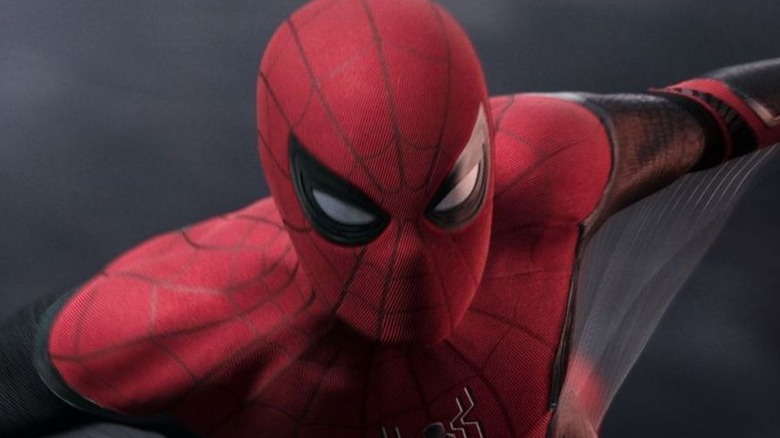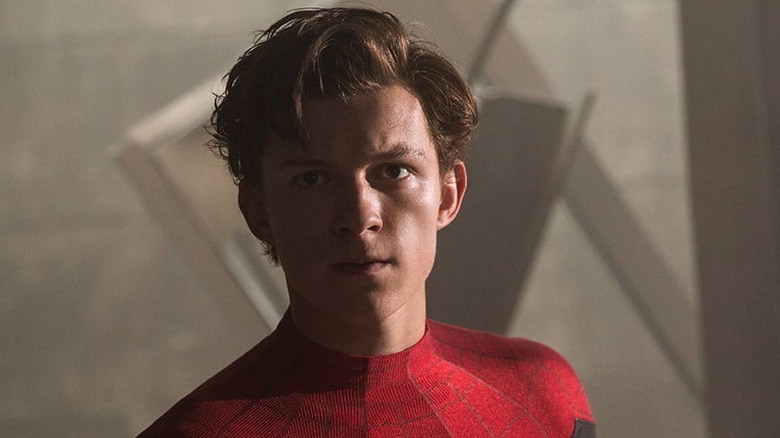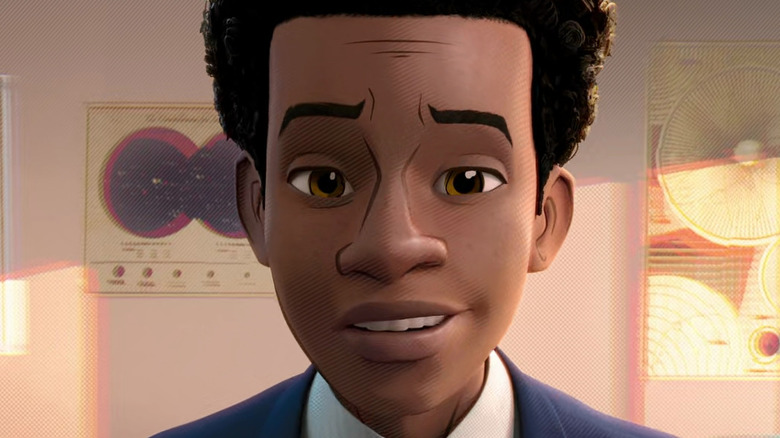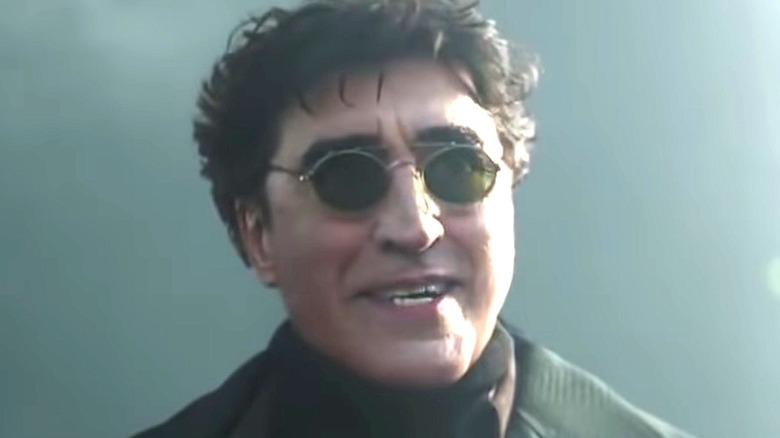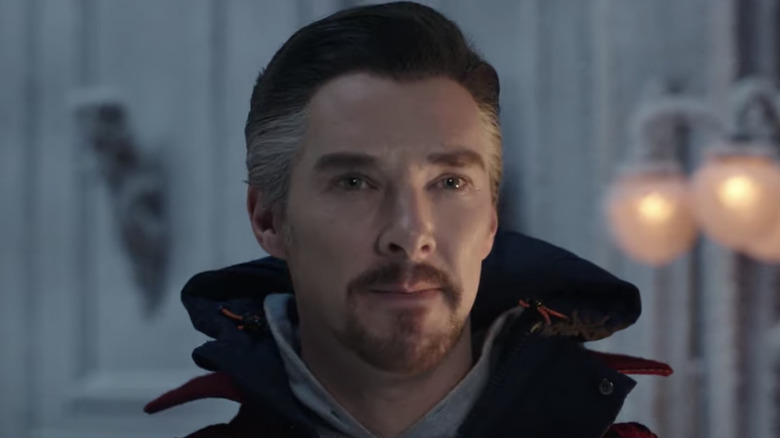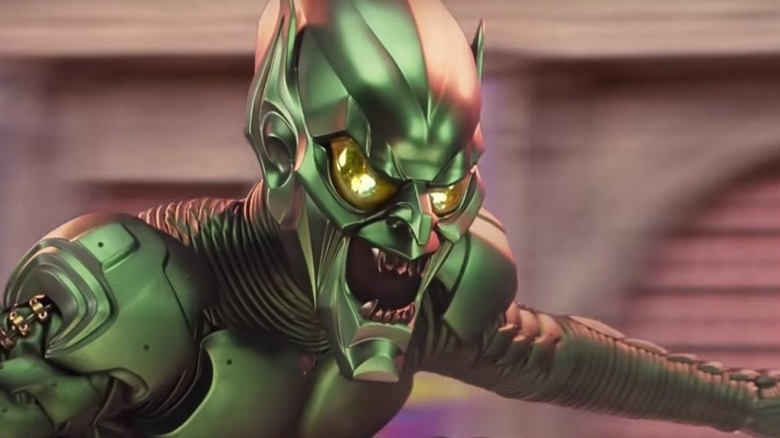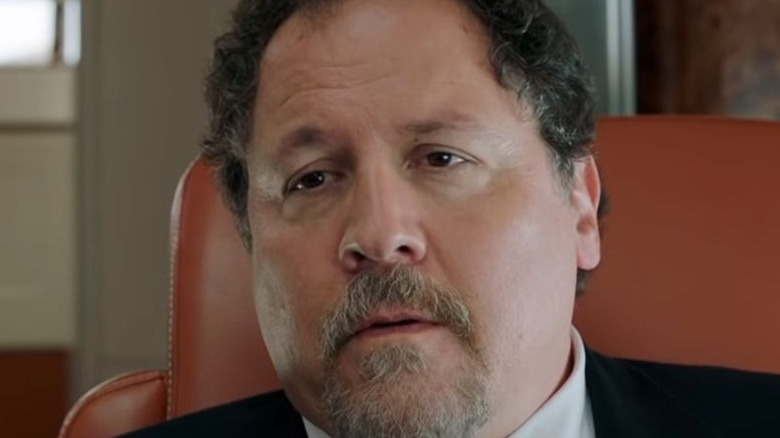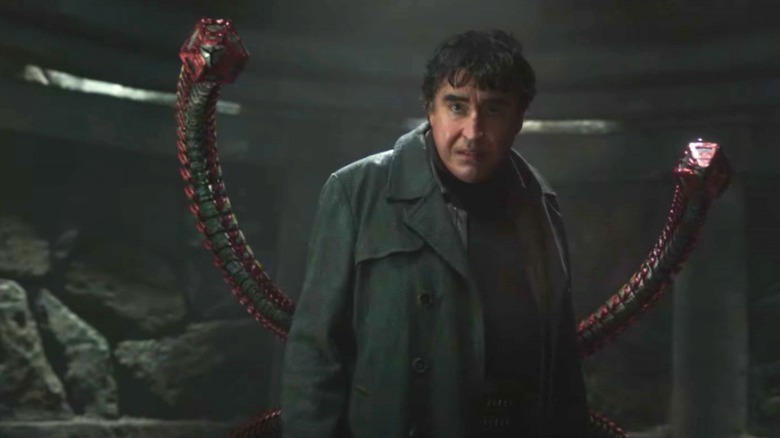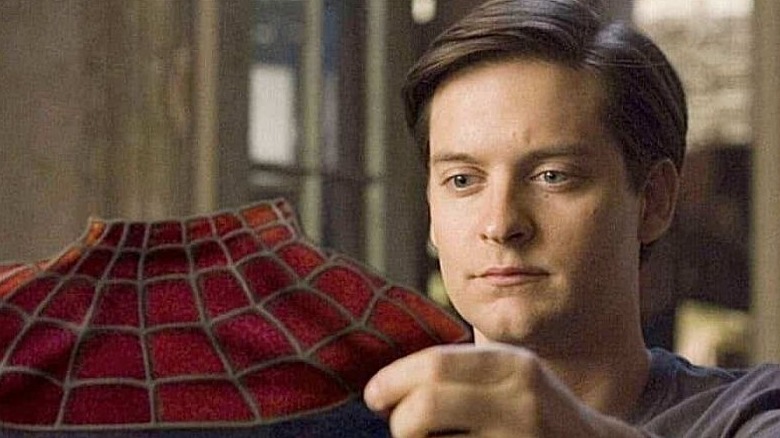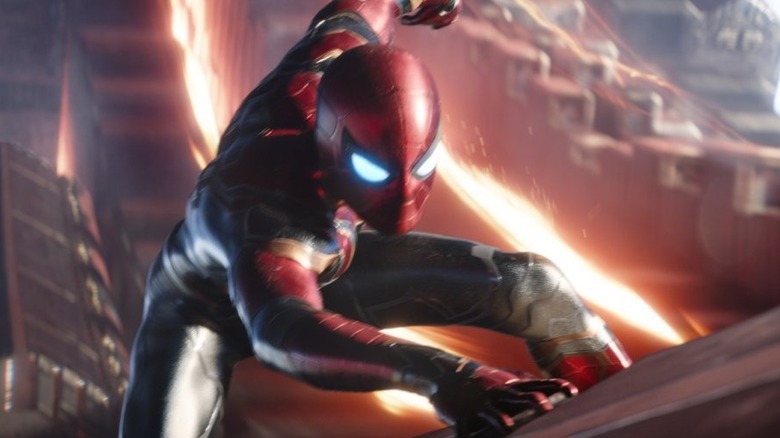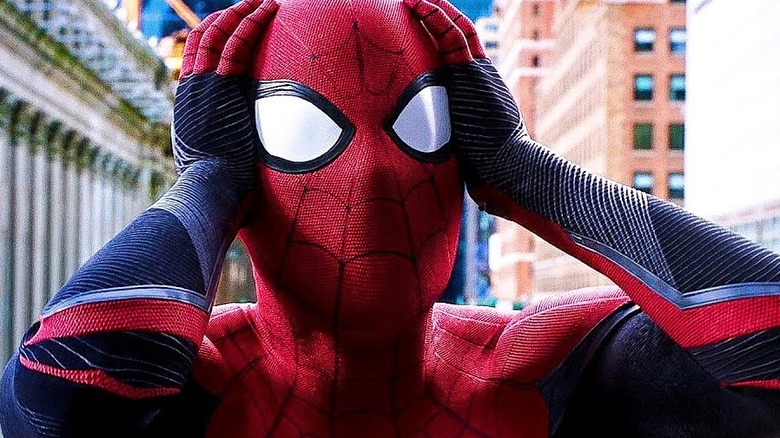Things They Should Avoid In Spider-Man: No Way Home
The Marvel Cinematic Universe has been great to Spider-Man since he debuted in "Captain America: Civil War" in 2016. His involvement was a monumental occasion as many fans weren't sure if they'd ever get to see the famous web-slinger standing on the big screen with his superhero counterparts. The film rights for the character have been owned by Sony Pictures for years, making it virtually impossible for him to join the MCU. Thankfully, Sony and Marvel Studios agreed to share the character, giving fans something they've been clamoring to see for a long time.
Spidey has appeared in five MCU films including two of his own: "Spider-Man: Homecoming" and "Spider-Man: Far from Home." Both films were hits with fans and critics, guaranteeing we would see the wall-crawler headline a third installment. "Spider-Man: No Way Home" will include Marvel's multiverse, allowing characters previously separate from the current series of films to threaten Tom Holland's Spider-Man. Not only is it an excellent way to pay tribute to the films of Sam Raimi and Marc Webb, but it will certainly test Spidey in a way viewers have never seen before.
Although Marvel and Sony have a phenomenal track record with the character so far, that doesn't mean there isn't room for disaster. Film is a collaborative medium for creativity and that sometimes results in choices audiences hate. Here are some elements the filmmakers should probably avoid in order to keep this winning streak going.
Don't Make This A Trilogy
Hollywood loves a trilogy. It's not difficult to see why. To market a series of films as a trilogy means that it has a solid beginning, middle, and end. They're one complete story told in three parts. However, sometimes a film series will be referred to as a trilogy retroactively. The original three "Spider-Man" films directed by Sam Raimi for example. Before the series was rebooted with director Marc Webb at the helm and Andrew Garfield taking over the role in 2012's "The Amazing Spider-Man," Raimi had been working on a fourth installment that never got off the ground. Now those first three films are considered a trilogy, even though that was never the intention.
So far we've had five films with Tom Holland as Spider-Man. Only two of those featured him as the protagonist, meaning we've only had two MCU Spider-Man films. Calling it quits and telling the world that this is the final chapter in the Tom Holland Spider-Man trilogy might be tempting, but it could be a mistake. Within the continuity of the films, the character is still in high school. He hasn't gone out on his own to figure out what being Spider-Man even means. If anything, the movies we've seen so far have been an origin story. We need more time with this particular Spider-Man before saying goodbye.
Hold Off On Miles Morales
The character of Miles Morales first appeared in the pages of "Ultimate Fallout" in 2011. He existed in an alternate Marvel timeline where Peter Parker was dead and he took over the role as Spider-Man. While the character was a hit with readers, it was the 2018 Academy Award-winning animated film "Spider-Man: Into the Spiderverse" that brought him into the mainstream.
In a world where we've already had three different Peter Parkers in less than twenty years, one can't help but wonder why Hollywood doesn't give Miles a shot. His existence has already been hinted at with the inclusion of Aaron Davis (aka The Prowler and Miles' uncle) in "Spider-Man: Homecoming." Therefore, it makes total sense to bring Miles into the fold. This third film, though, might be a bit early.
As mentioned earlier, Tom Holland's Spider-Man hasn't really had a chance to stand on his own and make a name for himself within the MCU. He's still seen as the kid from Queens with spider powers. He doesn't exactly stack up with the likes of Thor and Doctor Strange yet. Bringing in Miles now would distract from Peter's journey because the audience would be patiently waiting for Morales to get bitten himself and don his awesome black and red suit.
No Bloated Runtime
As the trailers for the film have shown, there are ;a ton of villains in "Spider-Man: No Way Home." After Peter disturbs Dr. Strange's spell to make the world forget Spider-Man's identity, the multiverse opens up and the rogues from the "Spider-Man" films owned by Sony Pictures make their way into the Marvel Cinematic Universe. This is an incredibly cool concept that pays tribute to the films that have gone before, but it's also a recipe for an overlong run time.
When comic book movies incorporate multiple villains, they tend to run very long. The reason for this is a narrative needs to give every character a satisfying journey. Admirable as that is, sometimes all you want is to see the hero take down the bad guy so you can go home. Perhaps "No Way Home" will be able to avoid this problem because these characters have already been set up in prior films.
Spider-Man works well when constantly met with adversity. He can never get too comfortable, so writers want to throw a lot at him to show audiences all the different ways he can manage to escape certain death. By all means, writers should bring in as many baddies for Peter to confront as they want, but they shouldn't lose sight of the fact that this is a movie about Spider-Man, keep the focus on him and the film is likely to fly right by without a single dull moment.
Ditch the Father-Son Relationship
The only parent in Peter Parker's life is his aunt May. His biological parents are dead, along with his Uncle Ben. The closest we've come to seeing this incarnation of Spider-Man having a father was Tony Stark in "Spider-Man: Homecoming." Stark felt responsible for Peter because he was the one who got him involved in the greater superhero game to begin with. He inspired Peter and did his best to keep him safe. Peter, in return, looked up to Mr. Stark and defied his orders every chance he could, because he's a teenager and that's what youths often do.
When Stark sacrificed himself at the end of "Avengers: Endgame," Peter was, again, without a father figure. He sort of got another chance with Quentin Beck in "Spider-Man: Far from Home," but he turned out to be a real jerk who betrayed Peter's trust and tried to kill him multiple times.
In this third film, Dr. Strange appears to have stepped in as the more experienced/knowledgeable authority in Peter's life as a superhero. However, Stephen Strange isn't exactly the nicest guy and he often keeps the people around him at a distance because he is super busy with sorcerer stuff. Seeing Peter try to fill that void yet again could be redundant at this point. Instead of seeking a mentor, it's time for Peter to make his own decisions and deal with the consequences.
Too Much Nostalgia
The original "Spider-Man" was released in 2002. That is plenty of time for kids to have grown up obsessing over it. "The Amazing Spider-Man" came out in 2012, and those kids are also approaching an age where they start to look back fondly on the films of their youth. This means that a healthy chunk of the audience who will be going to see "Spider-Man: No Way Home" will harbor strong feelings of nostalgia for the classic villains returning to take on Spidey again.
It's important to acknowledge those fans and not disappoint them. Chances are pretty good that they love these characters and the filmmakers should honor that. The danger, however, comes when a film decides to do nothing new with old favorites and simply remind you of all the things you loved about them. This often results in dialogue that is little more than callbacks and references. These can certainly be fun and rewarding for longtime fans, but the film ultimately suffers when its entire reason for existing is to be one giant reference to other movies.
Telling new stories with legacy characters allows audiences to see them in a richer way by providing more depth and texture. As long as you don't betray those characters, fans will be thrilled.
Don't Kill A Major Character
Peter Parker has experienced a lot of death in his life. As previously mentioned, his parents aren't around, his uncle Ben was killed, and Tony Stark is gone as well. He's actually made it through two of his own movies without someone he loves being murdered. That has to be some kind of record.
However, he's still a kid grappling with all the baggage that goes along with being his age in addition to having to save the world all the time. Also, at the end of "Spider-Man: Far from Home," his secret identity was revealed to the entire world, meaning he will have no privacy and his enemies can get to him and his family anywhere at any time.
These movies, and the comic books that inspired them, are all about testing Peter's resilience. The idea is to throw more and more at Peter to see if he breaks. Thankfully, he never really does. At this point, though, killing MJ, or May, or even Happy Hogan might push him over the edge. Hopefully, writers will keep his lucky streak going and kill a major character in a later film.
Too Much Universe Building
Marvel has perfected the art of building a shared universe. Starting with "Iron Man" in 2008, they gradually built an incredible masterwork of films and television shows that all worked together cohesively. It's something that other studios have struggled with, unfortunately. The reason the Marvel Cinematic Universe works so well is that it grew gradually over the years. Each film stood on its own while introducing elements which could be carried over and explored in later installments, as opposed to trying to shove everything into one movie and hoping people want to see more.
"Spider-Man: No Way Home" appears to be the closest that the MCU has come to over-stuffing a film. We've got villains from the first three "Spider-Man" films: Green Goblin, Doc Ock and Sandman. Then there's the Lizard and Electro from "The Amazing Spider-Man" films. Plus, there could potentially be more coming through. Also, Dr. Strange needs to properly explain the multiverse and how it works to viewers who may not have watched the Disney+ shows "Loki" and "What If?"
That's a lot to handle with one movie. It would be incredibly easy for Tom Holland's Spider-Man to get lost in the mix while setting up Sony's live-action Spiderverse, the Sinister Six, or whatever their plans may be. As exciting as all that is, the film cannot lose sight of who the star is, at the risk of ruining the audience's viewing experience.
No Emo Spider-Man
The very first image of the trailer released on November 16th, 2021 showed a battered Peter Parker in the rain. This suggests that Spidey is going to be tested to his limits like never before. Hopefully, this doesn't mean we will, at some point, be getting a glum, pessimistic Peter Parker. One of the many reasons for the character's longevity is his almost super-human ability to look on the bright side and keep swinging no matter what horrible event life throws his way.
Think about all he's lost before the start of "Spider-Man: Far from Home." Not only was he snapped out of existence for five years (along with half of the universe), but his mentor, Tony Stark, died and the whole world is mourning him. Peter spends much of that film worrying that he's expected to take Tony's place and that it's a responsibility he is in no way ready for.
Instead of lashing out and brooding over this for two hours, he focuses on the perfect way to tell MJ how he feels about her. This may not be the healthiest way to cope with his grief and anxiety about the future, but that's who this character is. He may not believe in himself enough to take over from Tony Stark and he may have no control over what the future holds for the Avengers, but he can control what he tells MJ and that becomes his goal. Please don't let Peter break.
Don't Sideline Tom Holland
If the rumors are true, we may be getting more than one Spider-Man in "Spider-Man: No Way Home." Since the story deals with the multiverse, it makes perfect sense to include some Peters Parker from other worlds — hopefully ones we've seen before. This is risky though. If previous Spider-Men Tobey Maguire and Andrew Garfield do, in fact, make an appearance, the danger is making the narrative all about them.
Both actors were great in their roles and have loyal fans who would give anything to see them don the red and blue tights again, but we have a current Spider-Man. Tom Holland has been owning the role for five films. There's a generation of fans who discovered Spider-Man through Tobey Maguire, one that did so via Andrew Garfield, and a third who would ride or die for Holland. The only way to truly balance out the weight of that pressure is by picking one Spider-Man and focusing on him.
The natural choice is Tom Holland, of course. Should we be lucky enough to get Maguire and Garfield, they should be supporting characters. The film isn't about them and they need to be in service of the current Peter Parker.
Too Many Spider-Suits
Spider-Man's look is totally iconic. It's an instantly recognizable image that evokes mystery and adventure. Even though we know who's under there, there's something ominous about those white eyes on a webbed face with no mouth. It looks cool no matter what you do with it. Every incarnation of the suit is fun in its own way. The problem comes in when the suit is also lined with insane technology.
In "Spider-Man: Homecoming" Tony Stark tells Peter that if he's nothing without the suit he gave him then he doesn't deserve to wear it. Basically, the suit is a tool meant to be used by someone who is a hero down to their very core. He proves himself, of course, and gets the suit back. Later on he even gets an iron suit that almost makes him a miniature, sticky Iron Man. Again, it looks very cool, but it almost robs the character of wonder.
Yes, the look is a very important part of what draws people to Spider-Man, but the joy of the character has nothing to do with the suit itself. We love Spider-Man because he can swing through New York City, stick to things, has super-strength, and a great sense of humor. Having costumes all decked out with tech diminishes him because he isn't meant to be able to get out of every situation with gadgets and armor. Spider-Man survives because he is resilient and clever. Go easy on the suits.
Keeping Spider-Man's Identity Public
At the very end of "Spider-Man: Far from Home," fans saw J. Jonah Jameson and Quentin Beck announce to the world that Peter Parker is Spider-Man. This is why Peter goes to Dr. Stange in "Spider-Man: No Way Home" to ask him to magically remove that information from everyone's head. Naturally, because Spider-Man's life is a constant uphill struggle, the spell goes wrong and the multiverse invades.
The desperation to keep his identity a secret is one of the most entertaining aspects of the Spider-Man character. He will do anything to make sure nobody knows his secret because he can't risk harm coming to the ones he loves. Should "No Way Home" decide to keep his identity public it would lead to a lot of tense and dramatic moments in later films, with villains targeting May, MJ, or Ned, but we would miss the ballet of secrecy that Spider-Man is destined to perform for the rest of his life.
